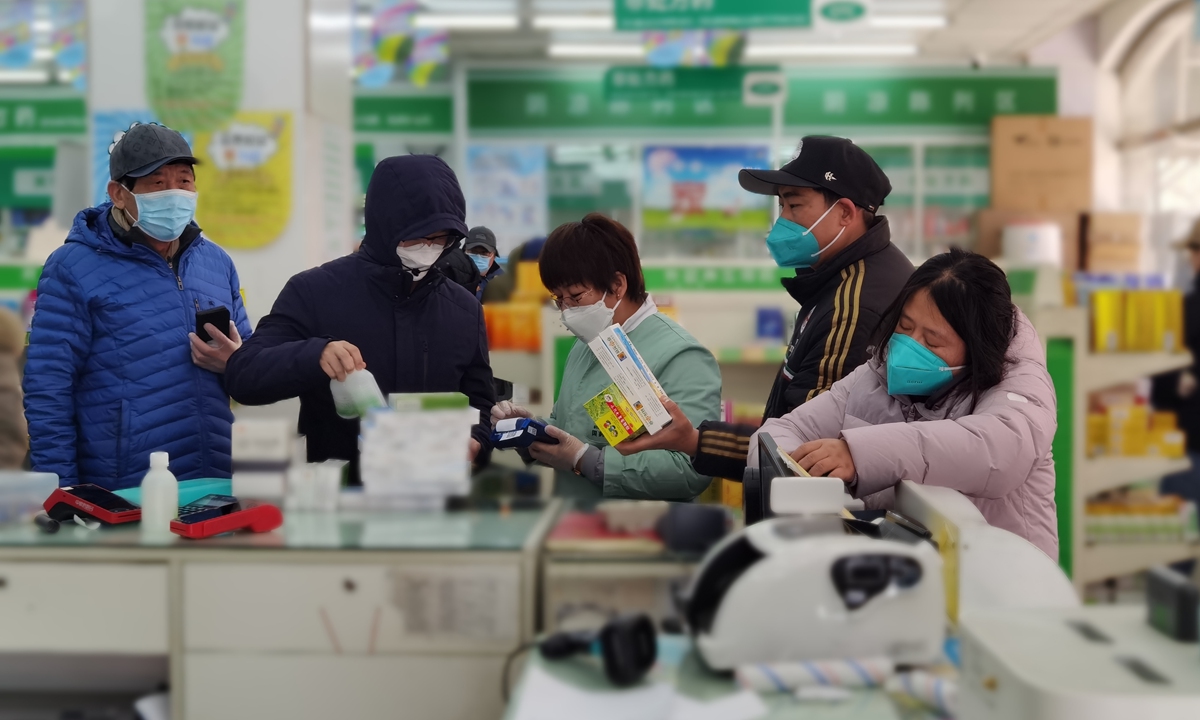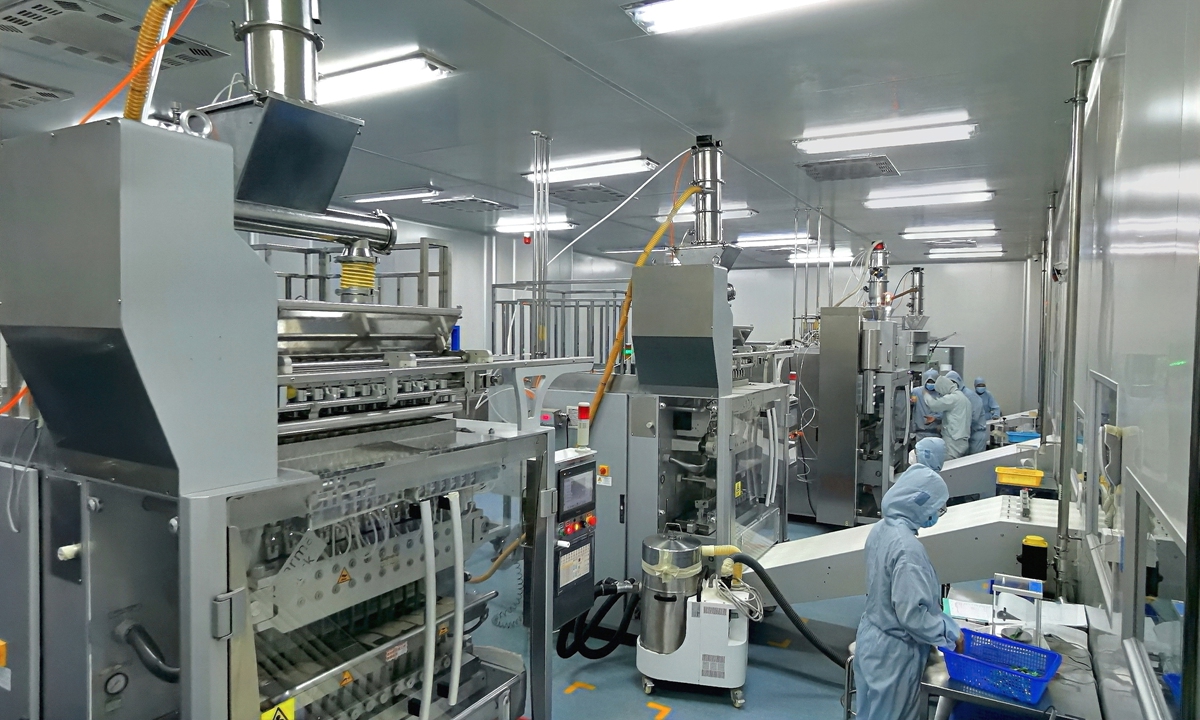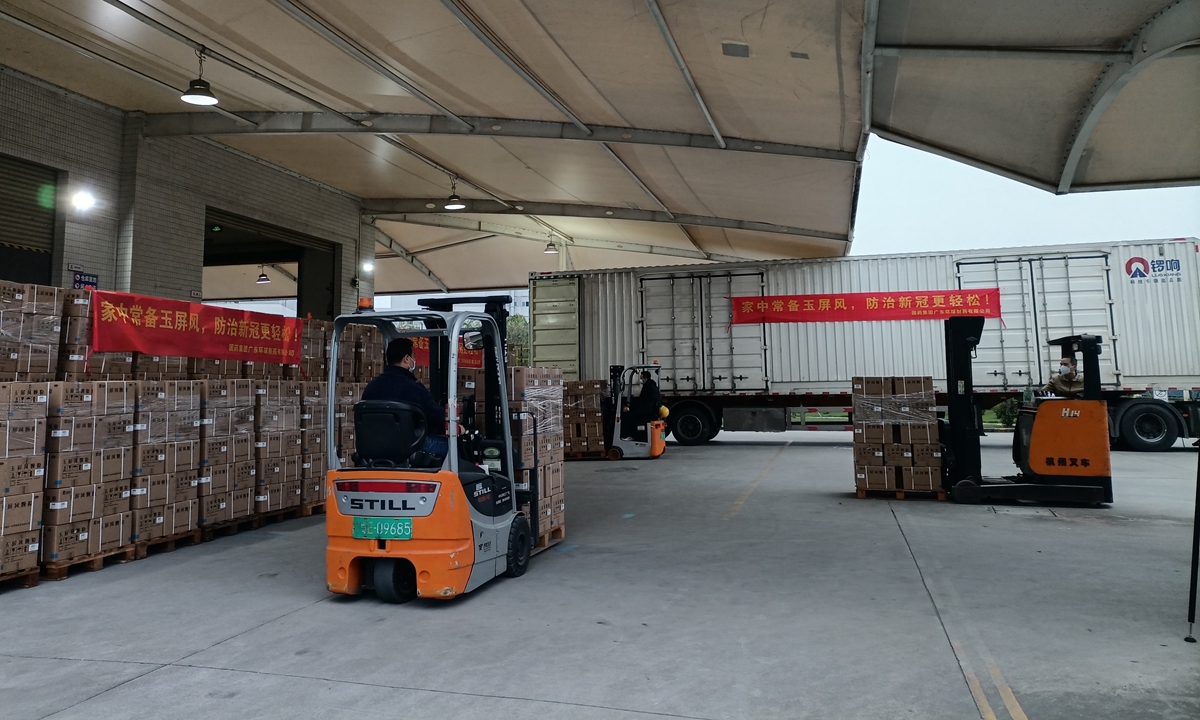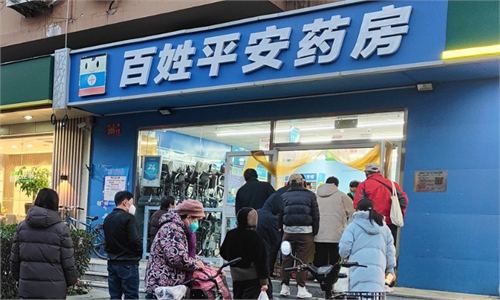Drug shortage to be gradually eased after producers operating 24 hours per day to increase output: Sinopharm

Customers purchase medical products in a pharmacy of Guoda Drugstore in Beijing. Photo: Courtesy of Sinopharm
Pharmaceutical companies in China are working overtime to produce drugs and gradually ease the tense demand situation as some cities show a serious shortage of medicines.
In addition, these giant companies are also taking advantage of logistics networks to deliver medicines to areas across the country, and retail networks are also taking measures to ensure ample supply.
China National Pharmaceutical Group Co (Sinopharm), a domestic pharmaceutical company with the strongest comprehensive production capacity in China to produce antipyretic, cough, antiviral and antibiotic drugs, said it is striving to meet public demand for medicines by setting up a special working group to ensure their timely shipment to key regions.
Over 1,600 industrial enterprises with 210,000 personnel belonging to the group are operating 24 hours a day to increase output, and the production capacity for key drugs is expanding to three times the normal level, Wei Dongsong, vice president of Shanghai Shyndec Pharmaceutical Co under Sinopharm, told the Global Times on Thursday.
"In the next step, we will take multiple measures to continue to expand production capacity and ensure supply," Wei noted.
With the continuous implementation of various market supply guarantee measures from the government and enterprises, it is believed that the tight demand situation will gradually ease in the near future, according to Jin Bin, deputy general manager of Sinopharm Group.
Since December, the surge in the number of people infected with COVID-19 has led to a shortage of antipyretic and other drugs, which has been exacerbated by some people's panick hoarding of drugs.
"At present, our company is producing at full capacity," a staffer from Shandong Xinhua Pharmaceutical, a producer of ibuprofen, told the Global Times on Thursday.
There should not be a shortage of medicines in the market, according to the current supply, but the fact that there is a shortage shows that there is still a lot of hoarding in the market, and some traders are also driving up drug prices, further causing an imbalance in drug prices, the staffer said.
To curb prices, Chinese officials have also been stepping up efforts to secure supplies. At a press conference on Tuesday, the National Medical Products Administration said that it has increased support for the market supply of medications related to the epidemic, including guiding pharmaceutical companies to conduct research in accordance with regulations and expand production capacity in an orderly manner.
Currently, there are 194 kinds of antipyretic, cough relief, antibacterial and antiviral drugs on the market in China, and CCTV reported on Tuesday that the raw material production capacity of ibuprofen and acetaminophen in China is sufficient, which is able to meet the domestic demand for production. For example, Shandong Xinhua Pharmaceutical's annual production capacity for ibuprofen can reach 8,000 tons, far exceeding the total demand of the domestic market in previous years.
The medicines do not use traditional delivery methods, but must be distributed by pharma-ceutical companies, which is mainly carried out by Sinopharm Group Co, China Resources Pharmaceutical, Shanghai Pharmaceuticals, and Jointown Pharmaceutical Group.
Sinopharm Group Co conducts efficient overall daily planning and deployment for more than 610 logistics centers across the country through the pharmaceutical supply chain network to allocate key medical supplies, said Yu Qingming, chairman, executive director and the secretary of the Party Committee of Sinopharm Group Co.

Employees from a member company of Sinopharm work overtime to produce anti-epidemic Chinese patent medicines. Photo: Courtesy of Sinopharm
Yu said Sinopharm's average daily shipment has reached more than 13 million boxes for the "four categories" that are in great demand - antipyretic, cough, antiviral, and antibiotics drugs - and the average daily delivery of four categories in the logistics hub exceeds 650,000 boxes.
Data from Sinopharm showed that 4.85 million boxes of pharmaceutical products have been shipped out from December 1 to 19, an increase of about 24 percent year-on-year, and an increase of about 31 percent month-on-month.
The vast rural areas and remote areas are suffering medicine shortages due to poor logistics infrastructure, which is different from large cities with abundant medical resources.
On December 16, the Joint Prevention and Control Mechanism of the State Council rolled out guidelines instructing rural areas with relatively limited medical resources on how to cope with potential outbreaks of COVID-19 infections during the upcoming New Year and Spring Festival holidays, aiming to ensure migrant workers and permanent residents in rural areas have access to timely and sufficient medical services.

Freshly produced drugs ready to be shipped Photo: Courtesy of Sinopharm
We will take advantage of online and offline channels, including 20,000 national pharmacies, SPS+ professional pharmacies and 200,000 small and medium-sized chain pharmacies and individual pharmacies to provide medical needs for rural areas, Yu from Sinopharm said.


